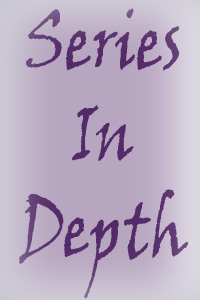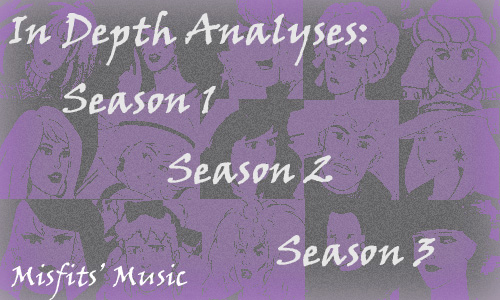Season Two: Exploring RENAISSANCE WOMAN
OVERVIEW... Britrock website copyright EA Woolley
RENAISSANCE WOMAN
This is, beyond all doubt the WORST episode that ever came under the header
of Jem. Yes, seriously. More so than Journey Through Time, The Day The Music
Died, Journey To ShangriLa or any of the others popularly cited by Jem fans.
THIS one is the worst. The absolute and total worst.
Now I've got that out of the way, what's the episode about? Good question.
The general belief is that Jem and the Holograms are at a renaissance fair
in England. Erm okay. Let's go with that premise...
JEM VS BRITISH HISTORY
It has probably not escaped anyone's attention that history is
my pet subject, and my degree is in mediaeval and modern history, emphasis
on the mediaeval. Though this in no way makes me an expert on any period
of history, it does mean that I have studied the periods through which this
episode dances in some kind of hallucinogenic fit. In order to try and work
out what the heck is going on, it is necessary to dissect these periods as
shown in the cartoon and decide where the episode is really set.
First of all, we have the renaissance fair. Now, this episode is set in
England. I am English. I have never in my life been to a renaissance fair.
I had never heard of renaissance fairs until I saw this episode. So to begin
with the idea of a renaissance fair in England is a bit farfetched. Why not
set it in America, and do the whole renaissance fair bit there? That seems
a touch illogical to me. But no, we are in England, at a "real English castle".
This is a very quaintly Mediaeval looking castle, which brings us to the
next theme of the story. Robin Hood.
Bearing in mind that most people in this country are generally aware that
Robin Hood existed in the middle ages, what on earth is he doing in the middle
of a renaissance fair? The romanticised view of Robin Hood is not mediaeval
at all - he was given as a bandit and a rogue in contemporary writings, if
he was indeed one person and not a collective picture of outlawry at that
time. It is possible to loosely tie him in with Simon De Montfort and the
rebellions in the reign of Henry III. Henry III was dead long before the
renaissance began. So, to cut a long story short...Robin Hood does not have
any place being in the Renaissance. For the record, too, the dress that the
characters are wearing is far more mid-mediaeval (contemporary with Henry
III) than it is close to Renaissance wear (Late mediaeval, tudor).
But, apparently, we're not in the renaissance. No, apparently we're at a
renaissance FAIR in nineteen eighties England. And if we accept that, and
accept that is the reason why Robin Hood's personality has skipped three
centuries to be there, then we have to raise another HUGE flag.
The people in the episode - the locals - are depicted as peasants working
for a mean and vicious overlord who cut their profits and cheated them. Even
if we stretch the imagination to the point that they are all dressed like
mediaeval villagers because of the fair, there is absolutely nothing in British
history or society which explains why, somehow, this little area of Carfax
(made up name) apparently avoided not only the social revolution that followed
the black death in 1349-51 (in which most feudal arrangements that strongly
benefited the barons disappeared), but also the INDUSTRIAL revolution in
the nineteenth century, when the concept of peasantry entirely disappeared
from British society!
So, to recap, we have a romantic would be hero from the thirteenth century
swanning around the renaissance which might or might not be a fair in the
nineteen eighties in a country where Renaissance fairs don't generally happen,
in a community still living with the values of pre-industry Europe, dressing
as peasants from the thirteenth century and speaking with accents that sound
like they came out of the nearest joke shop. (Unfortunately, with the exception
of Jetta, British accents are generally very badly done in the Jem series.
And particularly badly done in this episode.) The accents, if you can possibly
define what the heck they're meant to be, sound like appalling attempts at
cockney. No, I'm not pointing that out for the reason of more ridicule, but
more to locate where Carfax is meant to be in the scope of England. On those
accents, we can only surmise that the plot is set in a south east county,
somewhere like Essex. The South East of England, where Essex is, is the most
populated area of the country. For another thing, too, English counties are
not really small places. I live in probably the most rural county in England.
Even here, in the "backwater" west of the Welsh Marches where we have no
county city, we don't have peasants or overlords and the social changes of
seven hundred years have made themselves very plainly felt. I find it hard
to believe, therefore, that a county in the SouthEast, so CLOSE to London
would be so ignorant.
I have often been told that it's "only a renaissance fair" and that it is
not meant to be historically accurate. Yet Reginald (that evil Lord guy)
states himself right at the beginning that this is a "return to the days
of Merry Olde England". We can, then, discount the fact that the historical
inaccuracies are deliberate and simply because it's only a fair. Logically,
my own belief is that they are at a Renaissance Fair (although that is strange
enough) and that the whole setting is built out of an entire misconception
of English history and society in an unforgivably unresearched way.
This horrible mess of a storyline is further supported by that perpetual
plot of "the Lord isn't the Lord until x day" that plays a very important
role in this episode. Nope, Lord Reginald is not actually a Lord until his
twenty first birthday, even though his 'father' died eighteen years earlier.
(Of course, later we find it's not his father and that the old guy isn't
dead, but it still works out the same way.) It's just another example of
how big the holes are in this episode - if you happen to be a hereditary
Lord, you are a Lord from the moment the title holder dies. You do not "become"
a Lord on your twenty first, or eighteenth birthday. Not now and not ever.
You might not have control of your assets until that day, but you sure as
heck are Lord. Even so far back as the Middle Ages, a noble or a King inherited
his title on the death of his predecessor. I do not understand the recurrance
of the "not until x day" plot and in Renaissance Woman it's just another
black mark against the episode.
Perhaps the funniest line in the episode is Kimber's. "Are they acting, or
what?" She says, when Robin Goodfellow comes up and swipes the money from
the guards. And that one line can really sum up the whole story.
Do we think this is a promising backdrop for an episode? No, of course we
don't. But that is the only one we got. ^_^. So you can probably understand
that, based on the above evidence, pretty much everything in this episode
has to be taken with a ludicrously large pinch of salt.
THE INSANITY OF DANSE
Well, if all the historically chaotic background to this episode wasn't
enough of a brain bender to understand, this episode's principle character
is Danse. Danse is actually one of Jem's better friends, and, unusually for
a supporting character, she has the luxury of not one, not two but three
romantic interests during the course of the series. This episode is one of
those times, when she meets and falls in love with Robin Goodfellow, to all
intents and purposes Robin Hood. But Danse is out of luck, because the evil
Lord of the Manor has fallen in love with her and is determined to win her
over to his cause. Throughout all of this, it becomes clear that the Lord
isn't the real lord, who is languishing in a dungeon (They never are the
real Lords, are they?) The real lord is Robin Goodfellow's father (though
Robin doesn;t know it), and Danse, with the help of Jem and the Holograms
help to free him and reunite father and son.
Danse is usually such a reasonable, rational character. I suppose in
many ways, being the love focus of an evil Lord whilst in love with the man
she seeks is enough to make anyone a little bit doolally, but she does appear
to run around quite a lot bleating about tyrrany in this episode. In truth,
it's Danse who makes the lines blur between whether this is actually some
kind of fair, or if it's meant to represent some kind of weird reality. It's
not until Danse gets all into the idea of Robin being persecuted by this
evil Lord that the Holograms eventually get dragged into the plot.
TO THE RESCUE: FIGHT FOR THE UNDERDOG?
The songs in Renaissance Woman are a touch confusing. Firstly, there is
Love's Not Easy - a song which has been suggested should rightly belong in
the first run of episodes, in Island of Deception. Somehow it seems out of
place in this strangely quaint atmosphere that Renaissance Woman puts out...it
seems almost wrong that Jem and the Holograms should be performing on stage
in this world, rather than treating it like some kind of a fantasy. The real
significance of Love's Not Easy is the fact that it is during the performance
of this song that Lord Reginald decides that he must meet Danse. Perhaps,
then, there is a lost irony in the title of the song and the pursuit Reginald
makes in vain to snare Danse;s heart for the rest of the episode. It's quite
possibly true to say that everything he had fell down over the love of a
woman who spurned him. But then, at this point it does seem more like your
average Jem episode. Strange, and very BAD setting, true, but your average
x character falls for y character and Jem does a lot of singing. However,
right after that performance, everything takes a slightly wonky turn. Robin
Goodfellow makes his appearance, Kimber speaks her classic line, and suddenly
the barrier between reality and fiction gets horribly blurred. This is made
especially clear by thecontrast between Love's Not Easy and the later song,
To The Rescue. By the time Jem sings the second (extremely bad) song, it's
clear that she and the Holograms are swept up in the plot and the intrigue
and are determined to do what's right for Carfax.
In the music video Jem dresses herself up as Robin Hood, singing about
"fighting for the underdog", which is a line that sticks in my mind when
watching many, many other Jem episodes. It strikes me that very rarely does
Jem fight for the underdog unless doing so has some personal benefit for
her or her group or her extended family. And yet, the irony is that in THIS
episode, there is no benefit for her, for her group, or for her extended
family. She, admittedly, joins in the craze because of Danse, but for once
it almost is like Jem really IS out to preserve the rights of Robin and,
most importantly, the "peasants" of Carfax who are being unduly oppressed.
It begs the question as to whether or not this swell of good feeling Jem manages
to find inside herself to help these Carfax inhabitants stems from the fact
that, for once, the Holograms are not watching their back for the Misfits.
There are no Misfits in this episode (actually, I'm glad of it. Jetta's opinion
of the setting would probably not be repeatable) and it means that the Holograms
are free in a sense to do their own thing. There are other episodes where
this is also the case, and it does give the tone of the episode a different
slant. In some ways, you almost feel like JATH are the underdogs in this
particular episode. Unfortunately, making any kind of detailed analysis for
the motivation or behaviour of most of the characters is nigh impossible because
of the problem of what the setting actually is. Is it a renaissance fair?
Is it reality? Is it all acting or is it real life? Does it start as a fair
but get warped back into the past? We don't know. And, probably, we never
will.
FLOWERS IN MY HAIR...
This is one of the few positive moments in the episode. The
sweet, romantic dance at the end between Robin and Danse, flowers through
her rainbow coloured hair as Jem and the Holograms sing. Though it would have
been nice for Danse to sing the song, the close of the episode is significantly
better than most of the episode itself, as is the quality of the music. Perhaps
it's just knowing the whole thing is coming to an end - I don't know. Either
way, I'd prefer to listen to this song for twenty minutes, rather than watch
the rest of the episode.
CONCLUSION
With the exception of Raya's extremely strange archery moment, this episode
is a waste of space. It's unfortunate for Raya that one of her most distinctive
character moments not relating directly to the plot is in one of the worst
Jem episodes ever written. Consequently we will never know how it is Raya
can shoot an arrow so well. Mind you, given the rest of the episode, perhaps
it's just as well.
Episode rating: -4/10.

Original site concept c. 2001
This version c.2014
Please ask before using the images on this site. 



